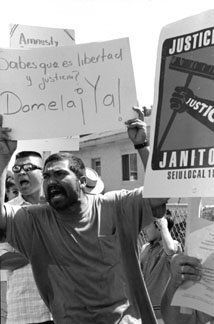|
|
|
Memories of last year's anti- globalisation protests at the World Trade Organisation summit and at the Spring meetings of the World Bank and International Monetary Fund will be re-lived on the streets of Prague at the end of this month with a series of demonstrations against the two Bretton Woods institutions. The protests, being billed as the biggest anti-globalisation demonstrations Europe has ever seen, will climax in what the government expects to be violent confrontations on the narrow streets of the Czech capital on Sep. 26. Unlike the protests at the annual Spring meetings of the Bank and IMF in April, the Prague demonstrations are expected to be more organised and will be supported by similar actions in many capitals of the world as the voices against corporate globalisation rise. ''Our aim is to amplify, not to speak for, but to amplify the voices of the people of global south in places where they are not able to be present, as in Prague,'' says Njoki Njoroge Njehu director of the 50 Years is Enough Campaign. ''Despite reports to the contrary, the global coalition against globalisation is getting stronger.'' The 50 Years is Enough Campaign, a US-based network for economic justice is part of the global movement that is organising the Sep. 26 protests during the World Bank and IMF annual meetings. The Sep. 19-28 meetings are being held amid growing calls from civil society organisations, trade unions and student movements for a reform of the operations of the Bretton Woods institutions and a suspension of their policies in developing countries. The Bank and IMF will bring together more than 18,000 bankers, finance ministers and government officials. Some 20,000 protestors are expected to crowd the narrow streets of Prague, some demanding wider reforms from the Bretton Woods institutions, others, their dissolution. The international non-governmental groups behind the 50 Years is Enough Campaign are pushing seven demands on the Bank and IMF. These are: * the cancellation of all debts owed them by poor nations * an immediate halt to the imposition of economic austerity measures and the abandonment of all versions of the Highly Indebted Poor Countries (HIPC) initiative offering relief in exchange for policy reforms * the acceptance of responsibility for the disastrous impact of the structural adjustment programmes (SAPs) and other macro- economic reforms on the economy of poor countries the payment of reparations to people relocated and harmed by large projects they have funded such as dams that the World Bank cease giving advice through the International Finance Corporation to advance the goals associated with corporate globalisation, advice such as privatisation that Bank and IMF officials complicit in abetting corruption be prosecuted and that the institutions involved provide compensation for resources stolen or damaged * that the future existence, structure and policies of international financial institutions be determined through a democratic and transparent process. Some 11,000 policemen will be deployed to deal with the 215 demonstrations that officials have so far been informed of. A further 5,000 military personnel and special police units will provide backup. The Czech government has also bought more than 200 new bullet-proof limousines. In what are seen as attempts to pre-empt and diffuse the protests, there are indications that the Bank and IMF will offer developing countries significant measures easing the conditions for debt relief to double the number of qualifying countries by year-end. The proposals, expected to be announced in Prague, would also simplify the requirements for countries that have already qualified under the enhanced HIPC,enabling these nations to start using their portion of the 17 billion dollars in debt relief. The countries that have already qualified include Benin, Bolivia, Burkina Faso, Cameroon, Honduras, Mauritania, Mozambique, Senegal, Tanzania, and Uganda. Bank officials in Washington refused to comment on the details of the plans. Rich nations pledged in Cologne, Germany at the G7 summit last year to forgive the debts of at least 20 countries by the end of this year. The process has, however, been bogged down in red-tape and tough conditions linked to structural adjustment programmes. The pre-requisite for qualifying for the enhanced HIPC initiative is that countries draw up highly complex Poverty Reduction Strategy Papers. Some countries say they do not have the resources to do so. It is expected that less stringent conditions would be demanded from another 14 countries including Cameroon, Chad, Gambia, Guinea, Guyana, Guinea-Bissau, Malawi, Nicaragua, Rwanda and Zambia, to enable them to qualify within the next three months. The Bank and Fund meetings are also expected to endorse a series of new poverty alleviation programmes, allocate more funds to fighting AIDS and to the education and health sectors of poor nations. The World Bank is also expected to announce a new low- interest multi-million dollar fund for poor nations. Last week the IMF board agreed to revamp its loan programmes to shorten the time countries may hold on to certain loans and to raise interest rates to discourage over-use, a condition that has been pushed by the US treasury. While the main anti-globalisation demonstrations will be taking place on the streets of Prague, mass action will also take place in many major cities around the world. ''The message is that we demand that the glo will protest genetic engineering and big international seed monopolies and workers will rally against privatisation. .nd to poverty. These foot-soldiers are mobilisi |

